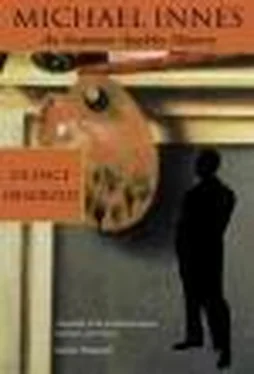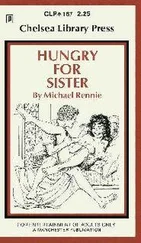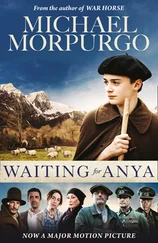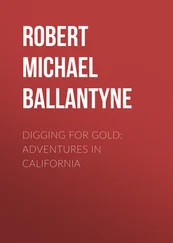Michael Innes - Lament for a Maker
Здесь есть возможность читать онлайн «Michael Innes - Lament for a Maker» весь текст электронной книги совершенно бесплатно (целиком полную версию без сокращений). В некоторых случаях можно слушать аудио, скачать через торрент в формате fb2 и присутствует краткое содержание. Жанр: Старинная литература, на английском языке. Описание произведения, (предисловие) а так же отзывы посетителей доступны на портале библиотеки ЛибКат.
- Название:Lament for a Maker
- Автор:
- Жанр:
- Год:неизвестен
- ISBN:нет данных
- Рейтинг книги:4 / 5. Голосов: 1
-
Избранное:Добавить в избранное
- Отзывы:
-
Ваша оценка:
- 80
- 1
- 2
- 3
- 4
- 5
Lament for a Maker: краткое содержание, описание и аннотация
Предлагаем к чтению аннотацию, описание, краткое содержание или предисловие (зависит от того, что написал сам автор книги «Lament for a Maker»). Если вы не нашли необходимую информацию о книге — напишите в комментариях, мы постараемся отыскать её.
Lament for a Maker — читать онлайн бесплатно полную книгу (весь текст) целиком
Ниже представлен текст книги, разбитый по страницам. Система сохранения места последней прочитанной страницы, позволяет с удобством читать онлайн бесплатно книгу «Lament for a Maker», без необходимости каждый раз заново искать на чём Вы остановились. Поставьте закладку, и сможете в любой момент перейти на страницу, на которой закончили чтение.
Интервал:
Закладка:
I record then, that my present pass is my own responsibility and fault. I have been childish and vindictive. And – what I fear irks me more – I have been a poor analyst of the mind.
In a sense vindictive, but in a sense I have cast a distorting charity over the past. I had come to feel that Ranald played me a mean trick, that he failed to play the game, and because of that I would give him a nasty jolt before going into my retirement for good and all. How childish the impulse – and how far out of the estimate of what lay between us! In running away, horses, water and all, in that crisis Ranald had betrayed himself – as a Guthrie, as a brother and as a man. And he had lived since in the eating consciousness of that betrayal, his life dominated by one shameful memory. I had fished him, a hysterical and grateful adolescent, from Fremantle harbour and a plentiful society of sharks; a few months later my blood was on his head in the bush. And the issue, to be played out in this lonely Scottish keep, is strangely tuned to the central truth of the greatest of Scottish tragedies, Macbeth . There is a blood guiltiness from which there is no turning back, no way out save forward through blood. Ranald remembers not a mean trick but a betrayal and a crime. Year by year the element of deliberation in his panic desertion of me has been more evident. Year by year the dynamics of guilt have taken firmer hold of his mind, straining and finally disrupting his personality, so that in any fix he will at once envisage himself as the trapped and ruthless man. Convinced – through my own melodramatic folly, no doubt – that I was coming like some wild Guthrie of the past to execute an absolute revenge, he laid his own plans at a level of uncompromising violence – though violence tempered by some elaborateness, some intellectually satisfying subtlety, to which I feel I have by no means penetrated. My spectre has overshadowed Ranald’s whole existence. Now that I have returned as if from the dead he has found some peculiar release in imposing a new perspective on my life, making the sacrifice of it no more than a move in some complicated game of which he is master. My death in the bush overwhelmed and destroyed him; my death at Erchany he will control and exploit. It is a ‘life line’ of some interest to mental science.
I wrote to him from Australia, giving some account of myself but saying nothing of my intentions – yielding to the foolish satisfaction of concocting vague menace out of reticence. He must have had ample time to lay his plans; to isolate Erchany, to dismiss servants, to secure the help of the creature Hardcastle. Ranald is being driven by years of abnormal development and I cannot find that I very much wish for justice against him. But Hardcastle is assisting at murder for pay. I hope they will get him.
I wrote once more to Ranald and told him that Dr Richard Flinders would arrive secretly on the night of the twenty-third of December. This will seem wanton and melodramatic enough, and its melodrama played with a nice irony into the hands of Ranald’s own melodramatic fantasy. But there was some sense in it. I did not intend that Ian Guthrie should come to life again and the hour would make it easy for my brother to arrange a wholly confidential meeting. Moreover there was implicit in the choice a hint of sentiment and reconciliation. In our boyhood we had held a regular tryst at this midnight, a tryst at which we discussed what the next midnight – Christmas Eve – would bring to our stockings. This implication, clearly, Ranald was in no state to catch.
The unexpectedly heavy snows presented me with a problem. But I have long been accustomed to sking – I doubt if the world knows that there are excellent snow-fields in Australia – and skis were easy to come by at my hotel in Dunwinnie: it is a centre, crowded at present, for such winter sports as Scotland is beginning to contrive. I reached Erchany somewhat hazardously by the shores of Ben Cailie.
I was received by Hardcastle with just the caution that I expected and taken straight to this tower. And here he and Ranald between them overpowered me. That is all. It is simple, astonishing and – if only because Ranald and I are brothers – curiously horrible. This little bedroom might have been designed as a prison; may have been a prison hundreds of years ago. I have done what I can. Several of the Erchany rats, bold and sluggish creatures, I have succeeded in catching and sending out as messengers: I think it likely that they have the liberty of the whole crannied building. And I have tried as good an imitation as I can manage of the Australian cooee, one of the most penetrating calls in the world. But the height of this chamber, the thickness of these walls, the gale and the muffling snowfall outside make it unlikely that the sound will be heard, or if heard thought to be other than an owl or a trick of the wind. Nor have I any evidence that Erchany is not deserted except for my brother and his man.
I have been given a book: Experimental Radiology by Richard Flinders – I must count myself lucky that Ranald has this sort of fantastic, rather than some downright sadistic, streak. It is clear and tidy, and has pleased me as well as another book. And medicine brings me to a final record. Ranald is not mad. His thoughts and actions are logically directed to certain realizable ends…
PART SIX
JOHN APPLEBY
1
Mr Wedderburn drew a long breath as I laid down the unfinished narrative. ‘Fratricide,’ he said. ‘And Miss Mathers was right. My interpretation of the facts came nowhere near the measure of Guthrie’s ingenuity. Ian’s murder by Ranald was to be read as Ranald’s murder by Lindsay. He killed his brother and incriminated his niece’s lover. It is madness.’
I nodded. ‘In the face of any moral order it is madness. And yet it all abounds in logic. He was very skilfully fulfilling needs and achieving ends.’
Sybil Guthrie stirred from the immobility in which she had listened to Ian Guthrie’s testament. ‘ Why ?’ she asked. ‘What drove him? What was his motive in such devilry?’
I considered. ‘There is a network of motive. You can work back in various directions, and dig down to various depths, and keep finding motives. There was what Ian saw: Ranald’s life lived under the shadow of that crime in Australia; all the massive feelings of guilt that abound in the neurotic crystallized on it; a resulting fearful certainty that Ian was coming for absolute vengeance; the conviction that Ian must be outwitted and destroyed. At the same time there was some deeper symbolism at work. Ian’s death in the bush had got on top of him; at Ian’s second and veritable death he would be on top.’
Noel Gylby clapped his hands like a child. ‘On top by several hundred feet…on top by the height of the tower!’
‘Exactly. And a psychoanalyst would find a symbolism yet deeper. I was thinking of it earlier today. When a man throws himself from a height he is taking a symbolical leap from danger – the perilous above – to safety – the secure below . In hurling Ian from the tower Ranald was achieving just what he had failed to achieve in Australia. He was rescuing Ian . In fact his crime was a stroke of wit – of the dark irony of which we have a good deal of evidence in Ranald.’
Wedderburn exclaimed: ‘Wit!’
‘In the Freudian sense. A reconciling of violently opposed desires at a verbal or symbolical level. The desire to destroy Ian: the desire to rehabilitate himself, to prove his own manhood, by rescuing Ian.’
There was a silence in which we could hear, behind the wainscoting of the gallery, the dragging movement of a poisoned rat. Wedderburn took out a handkerchief and passed it across his forehead. ‘I prefer,’ he said, ‘to encounter these abysses of the mind in text-books. And in medical text-books, not legal ones.’
Читать дальшеИнтервал:
Закладка:
Похожие книги на «Lament for a Maker»
Представляем Вашему вниманию похожие книги на «Lament for a Maker» списком для выбора. Мы отобрали схожую по названию и смыслу литературу в надежде предоставить читателям больше вариантов отыскать новые, интересные, ещё непрочитанные произведения.
Обсуждение, отзывы о книге «Lament for a Maker» и просто собственные мнения читателей. Оставьте ваши комментарии, напишите, что Вы думаете о произведении, его смысле или главных героях. Укажите что конкретно понравилось, а что нет, и почему Вы так считаете.











